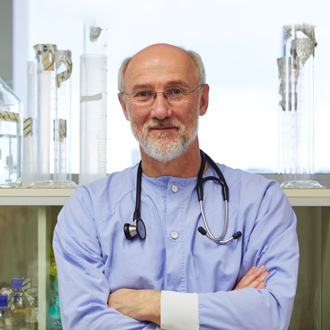Professor Karlheinz Peter
MD | PhD | FRACP | FCSANZ | FAHA | FESC

Deputy Director, Discovery Science
Head: Atherothrombosis and Vascular Biology
Head: Baker Department of Cardiometabolic Health
University of Melbourne supervisor
La Trobe University supervisor
Monash University supervisor
RMIT University supervisor
Torrens University supervisor
NHMRC L3 Investigator
+61 3 8532 1490 karlheinz.peter@baker.edu.auProfessor Karlheinz Peter is Deputy Director, Discovery Science and head of the Atherothrombosis and Vascular Biology laboratory at the Baker Heart and Diabetes Institute. He is also an interventional cardiologist at the Alfred Hospital. He is Professor of Medicine and Immunology at Monash University, and holds an adjunct professorial position at La Trobe University. Professor Peter holds a NHMRC L3 Investigator research fellowship, and is Head of the Baker Department of Cardiometabolic Health at Melbourne University.
Professor Peter underwent his basic science and clinical training at the University of Freiburg and Heidelberg in Germany. He did his postdoctoral training at Johns Hopkins University, Baltimore, and at Scripps Research Foundation, La Jolla, USA. Before Joining the Baker Institute, Professor Peter was the Director of the Cardiac Catheter Laboratory at the University of Freiburg. Professor Peter has received over 20 prestigious awards/prizes, including the central awards of the German Societies of Cardiology and Angiology as well as the Cardiac Society of Australia and New Zealand and the Australian Heart Foundation. He is editor (including chief and deputy editor) of several international basic science and clinical journals.
Professor Peter’s research is focused on the cellular mechanisms of coronary artery disease and its consequences, myocardial infarction, encompassing the role of platelets, coagulation and inflammation in atherosclerosis, as well as the mechanisms leading to the rupture of atherosclerotic plaques. He developed a unique mouse model of plaque instability/rupture that closely reflects the major complication of human atherosclerosis causing myocardial infarction. The prevention and treatment of myocardial infarction, both in preclinical and clinical research, is a major interest of Prof Peter. He has developed novel biomarker approaches and molecular imaging strategies using ultrasound, magnetic resonance imaging (MRI), CT, positron emission tomography (PET), and fluorescence imaging aimed at the localisation of thrombi, vulnerable, rupture-prone plaques and the identification of patients at risk for myocardial infarction.
One of Professor Peter’s primary research achievements is the development of drug-targeting approaches, such as human single-chain antibodies and various drug-loaded nanoparticles that display highly promising anti-platelet, anticoagulant, fibrinolytic, and anti-inflammatory properties but reduced side effects, such as bleeding and infections. Most recently, together with A/Prof Xiaowei Wang, Prof Peter founded a new Centre for mRNA Therapy of Cardiometabolic Diseases as one of the Baker Institute’s major research initiatives.

